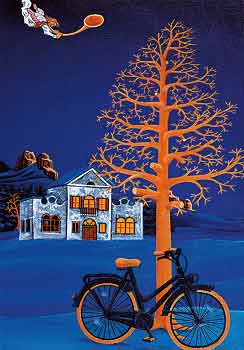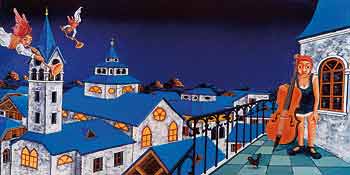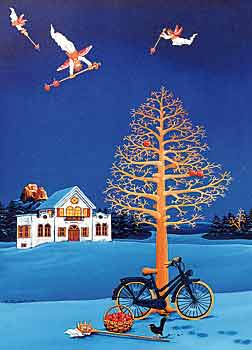| |
How to celebrate, when the opportunity arises
Antonín Kosík

Celebrations and festivity originated in the cyclical concept of time. In the changing of the seasons, in the revolutions of the Moon and the Sun (if the Earth were to orbit the Sun, there would be no festivals). If I don’t welcome Spring or the setting of the Sun, then Spring won’t come and the Sun won’t rise and there will be nothing for me to celebrate now or in the future. And it’s quite obvious that, indeed, Spring will not come and that the Earth will start orbiting the Sun rather than the Sun the Earth. Yet we only realize this when we start exploring the essence of these celebrations and festivity, thus robbing them forever of what made them graspable and losing them in the process. It’s just like if the alarm clock ticks, we don’t know why, if we know why, the alarm clock doesn’t tick (the very argument that the world is full of identical alarm clocks and that, if we take some of them apart, others tick holds certain premises, don’t you think?) – as soon as I start investigating the cause or consequence of a celebration, the festival’s over, but not the celebration.
If I celebrate my birthday, then I am celebrating (invoking) my rebirth and I experience earthly reincarnation. As soon as I add that I am celebrating my fiftieth, the reincarnation does not materialize, yet the wild celebration remains.

If a festivity or celebration becomes a subject of examination and benefits and philosophizing, its non-causal character starts to fade as its causality comes to the fore – just as a picture which originally refers to the world is in awe of the world. If the picture does this in an awesome manner, its very awe of the world gradually becomes itself a subject of awe and its awesome property – its awe of the world – can no longer function. Yet it remains a valuable piece of furniture over there by the sideboard. Likewise, over time magnificent festivity and celebrations become an end in themselves, and acquire a certain degree of synchronicity: if I celebrate, there’ll be a celebration, and if there’s a celebration, I’ll celebrate. As soon as this identity emerges, the celebration, given its purpose, is altogether unfruitful. However, it remains beneficial. Now, under the pretext of a festivity or celebration, all sorts of tomfoolery are possible: invite an important person to the celebration and take the opportunity to bite his ear off, exclude from a large-scale celebration those who mock us day in, day out, for not being able to afford lobster and caviar, or those whose derision is less obvious or more resourceful, or ultimately sell pictures from our celebration to every household. State and other institutional festivals are – as the name implies – a way for an institution to demonstrate its ideology, a way to wield and consolidate its power, a way to show that it is different from another institution which is otherwise the same, and so on, like the neighbour who invites you (or does he?) to his pig roast. That is why the first thing any new order does is to frantically change the festivals. Yet if it is as reasonable as its predecessor or – even better – similarly reasonable, it will keep to more or less the same number and dates.
That is why the sensible and the worldly-wise spend the time allotted to them by institutional festivity – which might even be Christmas – repairing a bike that has breathed its last before their repair, trying to solve unfathomable or flawed puzzles, perhaps counting the raindrops in autumn and the floors of the block of flats opposite in spring. Plain and simple: engaging in activities which, apparently at least, lead nowhere. But they do not force themselves into some sort of meditation, speculation, or even removal from the humdrum. That is something they can experience every day in the tram.
A grandiose celebration

The first guests slowly start descending on their flying carpets replete with air-conditioning and stabilizer wings, and even before they land there are grunts of unfeigned admiration of their comrades’ carpets. The area above the large terrace gradually fills up with swinging, undulating rugs, so many of them that the slapping and thrumming almost drowns out the speaker, his head thrown back: ‘All right, gentlemen, I don’t think we’ll be celebrating in the air, eh? Down you come!’ laughs the host while feigning annoyance. He skilfully casts jigging cups filled with the nectar of unripe cranberries among the carpets. ‘Are we all here? Nobody missing? Can we begin our party?’
‘Yes, yes, we’re all here, no one’s missing,’ the voices ring out.
Then they all fall silent. A red bulldozer passes by slowly, silently. The throng burst into cheers. The party was a sensation this year. Curious about what is being so joyfully celebrated and by whom? The red crunchers – you might know them by their scientific name of pokers – are celebrating the ripening of the cranberries. In a year and an ant day’s time they’ll come hither again. And then again, and again. On my honour. Otherwise those cranberries would never ripen.
Literature
Středoevropský luštitel a křížovkář
[Central European Crossword Enthusiast] No 6/78
|
|
